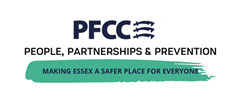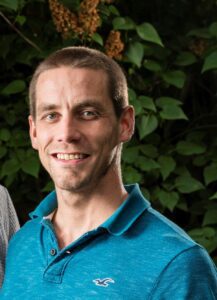People Partnerships and Prevention Conference
Police, Fire and Crime Commissioner for Essex Annual Conference 2022
Tuesday 24th May 2022
Colchester Stadium
The ideal of working together to make society a safer place for everyone is shared by many and the PFCC considers the power of partnerships is crucial in helping to make this happen. But as our understanding of crime is ever changing and developing, what can we do to ensure our partnerships continue to work effectively. What is current practice? How do we identify the right partners to link in with? What information should we share with who?
The PFCC Annual Conference 2022 will take some of the most harmful and impactful crimes affecting our society and ask what more we can do together to build on an innovative and agile approach that is focused on targeted prevention and early intervention. Sharing knowledge, experiences and ideas through the voices of victims, practitioners, policymakers, academics and interactive workshops, the People, Partnerships and Prevention conference will look at how we can continue to develop in new and ambitious ways towards making Essex a safer place for all.
To book your place at this event please use the following Eventbrite link: https://www.eventbrite.co.uk/e/people-partnerships-and-prevention-conference-2022-tickets-295094725267
Agenda
MC and host for the day Deputy Police, Fire and Crime Commissioner Jane Gardner
09:30 Welcome from Police, Fire and Crime Commissioner for Essex, Roger Hirst
09.45 Speaker – Gavin McKenna, pioneer behind ‘Reach Every Generation’ on transforming young lives for the better in Essex
10:15 Speaker – Prof Jonathan Shepherd CBE – Surgeon, Criminologist and Professor at Cardiff University’s Crime and Security Research Institute
10:45 Break (Tea and Coffee in workshops)
11:00 Workshop Session 1
12:00 Lunch & networking
13:00 Workshop Session 2
14:00 Chief Constable BJ Harrington – an operational approach to tackling High Harm, Domestic Abuse and Rape and Serious Sexual Offences
14:20 Young Essex Assembly – voices of young people and their experiences of misogyny and sexual violence
14:35 Speaker – Cllr Louise McKinlay– VAWG and Levelling Up in Our County
14:55 Speaker – Ryan Hart – award-winning domestic abuse advocate, author and international keynote speaker
15:30 PFCC Roger Hirst – reflections on the day
15:35 Conference Close
Speaker Professor Jonathan Shepherd CBE
By working with A&E departments across Essex, the police will be able to uncover and prevent more violent crime in the county. That’s the message being shared by surgeon Jonathan Shepherd as he brings his extensive research and proven work behind The Cardiff Model for Violence Prevention to Essex.
Jonathan is one of the keynote speakers attending this year’s Police, Fire and Crime Commissioner for Essex annual conference. During his speech, Jonathan will talk about the discovery he made in the 1990s that about three quarters of all violent crimes go unreported. As a surgeon specialising in facial injuries, he found that he and his team were aware of trends and hotspots their colleagues in the police had not yet been made aware of.
He said: “My work is all based on PHD research I carried out years ago. The police only know about a quarter of the violence that puts people in hospital. That was such a shock to me to find that out.
“I am a surgeon and for decades I was treating people injured in violence. Facial surgery is my specialism; faces, jaws, teeth. In the UK, the face is the target for injury in violence, whether it is punched, someone puts the boot in or it is glassed.
“I saw a steady stream every weekend where I would be in the operating theatre with people with busted jaws, broken cheek bones and eye sockets swollen up. It was that research discovery that provided the impetus for this work.”
Since the discovery, Jonathan has devoted his time and expertise to setting up the Cardiff University Violence Research Group, sharing his findings around the country and abroad to bring about a reduction in the number of victims of violent crime.
The Cardiff Model for Violence Prevention inspires a public health approach to violence prevention, which sees data collected and research conducted on trends which increase or decrease the risk for violence, before designing and implementing appropriate interventions.
Jonathan said: “This is about using specific information collected in A&E to reduce violence. We are identifying hotspots – particularly schools, licensed premises and parks – for violence for the police that they would not know about if it were not for A&E. Crack houses have been discovered in London purely as a result of data from A&E.
“The Model is evidence based; we know it saves money. It has made Cardiff safer in a way that was not possible without the partnership.”
At the conference, Jonathan is keen to explain the Model and help colleagues in Essex to implement the system and partnership working. In Cardiff, a violence prevention committee brings together the police, health and local authority to share information and hold each other to account as they work to reduce violence.
Jonathan said: “There is accountability in that group. Without it, the agencies would be working in silos. Together, we are greater than the sum of our parts – there is a real synergy.
“The information we share is very contemporary – I have read today about last week’s crime figures. We can act quickly when trends begin to show themselves, instead of working weeks or months behind the trends. New hotspots pop up all the time; a new nightclub can open and suddenly be all the rage. If you leave that unattended for a year, you have missed a trick. We want to be in there from the very start.
“I am coming at this as a surgeon who treats people injured in violence. This is a public health approach all based on that discovery that a lot of serious violence goes unreported. How can the police act if they are blind to these crimes? By working together, the real picture and opportunities for more effective prevention emerge.”
Roger Hirst, Police, Fire and Crime Commissioner said: “It is a pleasure to have Professor Jonathan Shepherd speaking at our annual conference this year and sharing his extensive research and knowledge into the field of violence prevention. Protecting vulnerable people, cracking down on violence and crime are all key priorities for me. I know that Jonathan’s work will be of interest to all of us attending and will influence the way we work in partnership in Essex, to intervene early and deter violence from happening in the first place.”
Speaker – Ryan Hart
A man who lost his mum and sister at the hands of his abusive father hopes by telling their story he can help people in Essex to spot the signs of coercive control. Claire and Charlotte Hart were killed in 2016 by their husband and father Lance after they fled their abusive family home after decades of suffering.
Having lay in wait for them at a local fitness centre near their home in Lincolnshire, Hart shot them both dead before turning the gun on himself.
Son and brother Ryan is one of the keynote speakers attending this year’s Police, Fire and Crime Commissioner for Essex annual conference. By talking about the events leading up to the murder of his mother and sister, Ryan – and brother Luke – hope to give a better understanding of how both victims and bystanders can recognise the signs of coercive control.
Ryan said: “We were living it for 25 years and, for a long time, had no idea we were the victims of abuse. We were blind to it. This was just our life. If we did not know we were victims, how are people outside supposed to see it?
“When anyone came to visit, our father acted differently, he put on a show; he acted like the nicest guy in the world and did everything and anything for our guests. As a result, when I saw friends’ parents, I assumed they were just acting, too – I thought that’s how the world worked. I always believed domestic abuse was about violence. Our father was never violent to us; he didn’t need to be. He had many other ways of controlling us. We never knew what we were living through was abuse.”
“I want people to understand what coercive control feels like from the inside, how it affected us. It is a crime that is very hard to understand because of how bespoke it is to each victim. It is not like other crimes where there is obvious evidence; it is obvious when someone has been assaulted. With coercive control, it doesn’t leave evidence and so can be missed.”
For the Harts, coercive control was not what their father did to them, rather what he did not let them do – limiting their choices and, ultimately, making escape almost impossible.
“Looking back, there were red flags, but we didn’t see them. Our mum and sister lost their lives long before he killed them. They had no opportunities to have friends, to have hobbies or to go on holidays. He stopped them from living and that can be overlooked. The small things build up into a crushing weight that stops you doing anything. Together, they are so devastating.
“Now, we can share our story and what we wish we had known and the support we now wish we had had. Talking about it is helping us to understand better and to move on and grow. Speaking about it is a crucial part of our recovery.
“I just want to articulate at the conference the impact on a victim, the sort of things they might be doing or not doing and what to look out for. Knowing we are making a difference is making the pain bearable.”
Roger Hirst, Police, Fire and Crime Commissioner, said: “There is no better way for us to learn than to hear from those who have lived experience. Our work recognising and dealing with coercive behaviour in Essex will be all the better for hearing from Ryan at our conference.
“What a brave family for speaking out and helping others in this way. We are so very grateful to have the opportunity to gain this valuable insight.”
Gavin is one of the keynote speakers attending this year’s Police, Fire and Crime Commissioner for Essex annual conference. During his speech, Gavin will share the message that finding the reason behind criminal behaviour will help in the prevention of future crimes.
He said: “Growing up, I only had access to drug dealers and criminals. I was raised by that environment. They were not positive people. I got involved in drug dealing and carrying weapons for protection. It went downhill from there. I had someone threaten to shoot me and knives were an everyday occurrence. I went to six different primary schools and was expelled from secondary school in Year 7 as I carried a weapon.
“It wasn’t until I went to church and met my football coach who started mentoring me that my life began to change for the better. I met people who looked like me and dressed like me, but they did normal stuff. They didn’t walk around carrying a Bible. I could relate to them. I started forming relationships with positive role models. I had never had that before.
“When I look back on my life now as a grown man, I have an understanding and knowledge I did not have then. I can articulate what I need. Back then, I articulated through my behaviour. Everything I did triggered a referral, to a pupil referral unit for example. The sad thing is, it was the cause of the behaviour that needed to be addressed.
“Even the label ‘gang member’ – I used to let people call me that. I was not that, I was a broken child who made bad choices. When you give people a label like that, it allows them to get away with doing less.
“Everything stems from if you have a positive role model and life skills. If I had had a positive role model sooner, my life would have been different. But, what choices did I have? I have to live with the trauma and the consequences of what I did back then. I am half the man I could have been. It doesn’t matter how successful I am now.
“I am now using my lived experience to help the professionals to help young people earlier, rather than seeing them get dragged into the criminal system.”
Roger Hirst, Police, Fire and Crime Commissioner, said: “Our theme for this year’s conference is Prevention. We are working to change mindsets to ‘prevention is better than cure’. We want to uncover the reasons behind crimes happening in Essex in the first place and work on providing the solutions as a way of preventing reoffending and further similar crimes happening in future.
“With Gavin’s lived experience, we can learn so very much by getting inside the head of a young, frightened man who turned to a life of crime simply because nobody showed him an alternative, more positive path. What a valuable insight that will provide to us all.
“We are so very thankful to partners like Gavin who are willing and able to share their own stories to help us to move forward in the right direction.”
Workshops
To make the most out of the day we encourage you to book in advance your place at two workshop sessions. Please choose two from the following list (one am and one pm session).
Workshop 1 Understanding Women and Girls Safety in Open Spaces – Project Minerva – Are there areas in Essex where females are more vulnerable to victimisation in relation to violent and sexual offences? If so, how can we use the identification of these to shape interventions that reduce victimisation? Minerva is an exciting new tool that effectively informs a multi-agency approach to prevention and early intervention activity around women and girls’ safety in open spaces. In this workshop delegates can find out how we can identify the location of these areas of greater vulnerability, help shape the nature of the tool, and the dissemination of data and the insights it will provide.
Workshop 2 Preventing Serious Violence on our Streets – Learn more about the innovative approach Essex Police are taking to preventing serious violence on our streets through data informed hotspot operations. This workshop will look in detail about this approach and how it was used in Southend to cut crime by 74%. Delegates can examine how hotspot areas are identified and what they can do to help prevent serious violence and crime happening in their communities.
Workshop 3 Reducing Deaths and Seriously Injured on Our Roads – It is a tragic fact that more people die on Essex roads each year than from all other crimes combined. In this interactive workshop learn how you help shape the Essex response to this tragic statistic, and take a new path that will achieve a 50% reduction in the number of road deaths by 2030 leading to the zero road death in Essex by 2040.
Workshop 4 Changing Futures – How can we improve outcomes for adults experiencing multiple disadvantages that include complex combinations of homelessness, substance misuse, mental health issues, domestic abuse and repeated contact with the criminal justice system? This interactive workshop delivered by the Horizons Project Team and Full Circle Services looks at the journey of the individual, the steps they take forward as well as those they take back and explores the interventions that are available to help them achieve more positive outcomes and reduce reoffending.
Workshop 4 AM – Changing Futures Tickets, Tue 24 May 2022 at 11:00 | Eventbrite
Workshop 4 PM – Changing Futures Tickets, Tue 24 May 2022 at 13:00 | Eventbrite
Workshop 5 Safer Streets Funding – The Safer Streets Fund invests in the delivery of place-based crime prevention plans, reclaiming our streets so we all feel safer. At this workshop hear about the Chelmsford Safer Streets project, which received £550,000 of funding, and the innovative projects that underpin it. You’ll hear from the team delivering the project who will share their experiences, the lessons learned during delivery and how it is already making areas in the city safer for all.
Workshop 5 AM – Safer Streets Fund Tickets, Tue 24 May 2022 at 11:00 | Eventbrite
Workshop 5 PM – Safer Streets Funding Tickets, Tue 24 May 2022 at 13:00 | Eventbrite
Workshop 6 ECFRS & ECC using data and insight to prevent and prioritise – What would you do differently at home, in your community and through your organisation if you had easy access to detailed information about all fire incidents? How might this insight change your approach to addressing community problems, supporting our most vulnerable residents and prioritising resources to proactively tackle areas of high risk? Join Essex County Council & Essex County Fire and Rescue Service to hear about a new approach to prevention and prioritisation that brings together partners’ data to generate joint insight on our shared challenges.
Workshop 7 VAWG Firebreaks and Cadet Interventions – Essex County Fire and Rescue Service has been working with Essex County Council, Anglia Ruskin University and Essex Police to create a bespoke intervention programme to tackle Violence Against Women & Girls. This workshop will present the ‘In Her Shoes’ lesson created by ARU’s Students at the Heart of Knowledge Exchange project. The programme is being used to engage young people around their roles and responsibilities in creating safer spaces for women and girls. Delegates attending the session will actively take part in the lesson to gain a greater understanding of the desired outcomes expected for young people.
Workshop 7 AM VAWG Firebreaks and Cadet Interventions Tickets, Tue 24 May 2022 at 11:00 | Eventbrite













